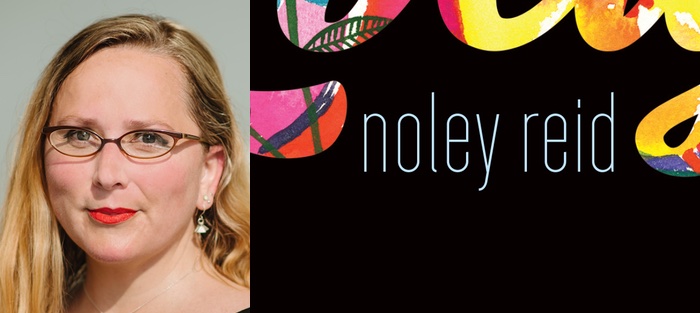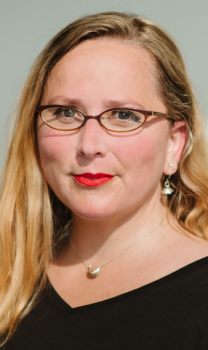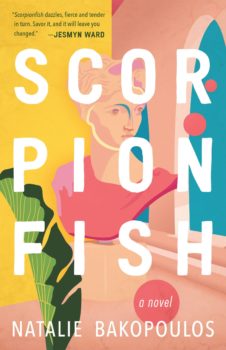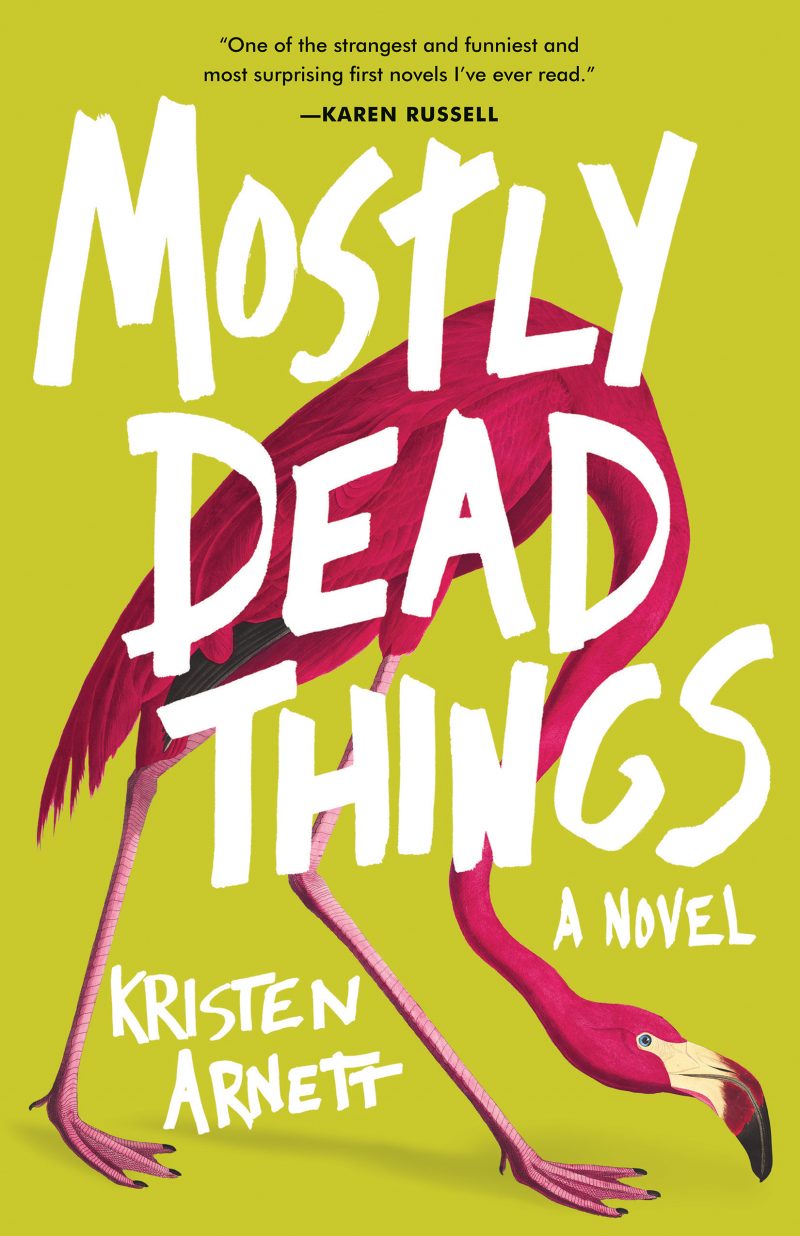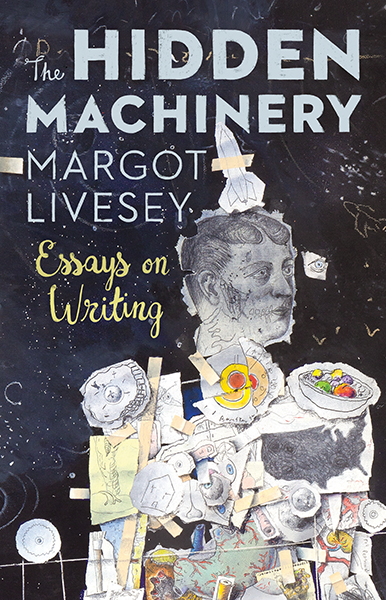Noley Reid’s Pretend We Are Lovely (Tin House Books) is the story of a family who has undergone a horrific tragedy—the death of a child, the middle sibling, the only brother. The novel, the story of the Sobel family, is and isn’t about that death; it’s set years after the tragedy, and while the death is still a constant ripple through the book, it’s not the main engine of the story, which I think is one thing that sets it apart from other books about the loss of a key family member (my own book included!).
Instead, at the moment that the reader meets the Sobel family, what is most pressing is Francie’s grave eating disorder, how it has ravaged her body, her mind, and thus her ability to effectively mother her children. Tate, their father, does his best, but he’s often distracted, or overwhelmed, and it doesn’t help that he’s having an affair with one of his students. The two girls, Vivvy and Enid, are left to their own devices much of the time, climbing trees, sneaking food, and spending perhaps what is too much time with the neighborhood boy.
Oprah Magazine has called Pretend We Are Lovely “a scrumptious novel about the things we use to save our fractured relationships.”
Noley Reid is a graduate of the M.F.A program at George Mason University, and she now lives in Indiana. I chatted with her back and forth over email about her wonderful book.
Interview:
Annie Hartnett: Pretend We Are Lovely is told from alternating points of view, rotating through all members of the Sobel family: Tate and Francie, and their daughters, Vivvy and Enid. One of the things that amazes me most about your book is how distinct all four voices were. Was the book always told in these alternating points of view? When and why did you make that narrative choice?
Noley Reid: When I first began writing the book, I put Enid and Vivvy in the pine tree they always hang and swing on. Enid narrates that first scene and she is a sort of sounding board for Vivvy, who has just decided that where their mother goes every day (to play tennis) is not where she actually goes. Enid, who is ten, doesn’t respond precisely as Vivvy, who is twelve, wants her to. Vivvy’s thinking of secrets and what they mean and are for everyone in the family, including herself. And Enid’s thoughts stop at knowing their mom isn’t off playing tennis. As soon as I was done with the scene, I knew I needed more narrators because I didn’t want Enid to be the reader’s only lens.
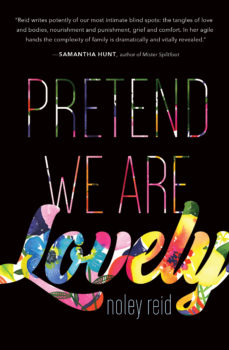 Which character’s point of view was hardest for you to write? I imagine it was Francie, the mother, compulsive exerciser and disordered eater, because I imagine she is more withholding from the writer, just as she is more withholding with the reader, but maybe that wasn’t your experience.
Which character’s point of view was hardest for you to write? I imagine it was Francie, the mother, compulsive exerciser and disordered eater, because I imagine she is more withholding from the writer, just as she is more withholding with the reader, but maybe that wasn’t your experience.
You’re absolutely right: Francie was the toughest point of view. Her obsession with food and body image are nearly all she can see. Her narrative presence in the book is purposefully out of step with the rest of the family and becomes even more so as the book progresses. What was difficult was discerning just how out of step to make her. The perspective itself, though, was one of my own.
You’ve described the experience of writing this book as beginning as a “narrow crack of light.” What did you mean by that? Was this book therapeutic for you in some way?
Truly, I possess each of the living Sobels’ perspectives on food and body. I have been pudgy Enid hiding down in the basement with a contraband chip bag, mowing through until there’s nothing left but the salt on her fingers. I have been skinny Vivvy, who doesn’t need to eat anything on her plate and is perfectly happy just to push it around with her fork until finally released from the dinner table. I have been heavy Tate with a spoon and a new ice cream carton that goes soft in his hands as he polishes off the whole thing. And I have been gaunt Francie with a sack of iceberg lettuce and her kitchen scale and calculator, measuring out seven calories of it and being perfectly content with that meal.
When I began this book, I’d just spent a year losing 181 pounds and a year maintaining my new 106-pound body. I didn’t think of it like this at the time but once I was no longer treated as a social pariah, I believed I could finally find someone to love and to love me. I dated like it was my job, using Match.com to maximize my chances. The dates and few short-lived attempts at relationships were total disasters. No matter how little I weighed, my body was still that of someone so much larger and my dates backed off.
I moved away, took a job in another state, and invited all my new colleagues to a Moroccan party night. I cooked for a week, everything I could make in advance. At the party I served phyllo fish cigars, phyllo pie layered with spicy chicken and almonds, eggplant strata, lamb meatballs, cheese and honey-stuffed dates, and sweet warga and I ate none of it. Not a single bite.
Not that night but one night soon after, I started to binge. I ate my allotted calories for breakfast, lunch, and dinner but after getting ready for bed, I stole back to the kitchen and ate everything I could possibly squeeze into my stomach, which then ached all night. This went on for a couple of months and all the while, I didn’t think about the book I was writing as having anything to do with me. I didn’t see myself in Francie or any of the other characters. From this distance now, though, I cannot unsee that the characters’ lives are all mine in a very different, fictive context. And from this distance, I see, too, that how I got through that awful time in my life was by writing the story of the Sobels. I don’t think the act of writing the book was therapeutic but, now that the book is out, talking about its origin in my own obsessive not-eating and eating brings some comfort. I’ve heard readers say they see their own relationships to food and body image in the book and there’s real power in seeing oneself represented that way. And that recognition sure makes me feel less alone in my own struggles with food and the body.
I struggled pretty hard with an eating disorder in high school and, while I came out the other side relatively unscathed, I still don’t like to talk about it. I really appreciate this honest account of what it’s like to have an eating disorder—how shameful, painful, out of control. What role do you see your book playing in the conversation about disordered eating?
I’m sorry for your experience and so glad you emerged from it. For you and for other readers who have experienced disordered eating, I hope reading this book lets them know they aren’t alone. Shame is such a strong inhibitor to sharing this fact of our lives and how very alone we feel works to prolong the disorder and its emotional toll on us. I hope Pretend We Are Lovely will encourage more of us to talk about our relationships with food and body. And I hope this book helps make a little more room for fat people in this world, and for the notion that we are human beings, too.
Some of my favorite moments—the ones I’ll never forget—are how brutal and unflinchingly cruel Francie, and Vivvy, the older sister, are to Enid, the youngest. Why are those moments so important to your overall story?
It was important to me to get these moments just right. I know exactly how it feels to be Enid, ridiculed for being a chubby kid and liking food. But I also know what it’s like for Francie to be able to see nothing but excess when looking at another human being and comparing them to her regimented self. Such hubris. Such entitled disdain. Vivvy’s cruelty to Enid is partly that thin-person entitlement and partly her own way of redirecting her self-doubt and the ridicule she experiences with her friends. She is attracted to boys and girls and, as a twelve-year old in 1982, that wasn’t something she could even understand or allow. Vivvy is a tight ball of so many worries that all come out of her as meanness.
Yes, Vivvy’s sexuality is such an interesting subplot, and I especially loved the storyline set at sleep-away horseback riding camp. Did you always want to remove Vivvy from the rest of her family for a bit? I’m curious about how you mapped out how you would have both girls change throughout the book.
I’m not much of a planner. Not until the end of the book when so many pieces need sequencing did I ever really consciously think about when something would happen and what else it would cause. Vivvy is on the cusp of the age at which we all practice leaving our parents over and over again through literal distance and every little choice we make, so it felt right that she should go away to horse camp and spend lots of afternoons with her school friend Dawn. This lets Enid be without protection (not that Vivvy always gives it) on the school bus and with the neighbor boy, which pushes and pushes Enid to her tipping point. Vivvy gets to her own tipping point outside the family, too. It’s important to see each girl as she presents herself to the world and then back at home, privately, with each other. The former suggests who each girl wants to be while the latter, I think, shows who they really are: Enid raw and aching, and Vivvy cruel yet tender.
I also love how Enid, the youngest child, begins to come into her own throughout the book, and even starts pushing back against her mother and her sister. Was that something you thought about—how to give your youngest character some power, some space of her own? Enid is the character I was rooting hardest for. I just loved her. Can you talk more about how you developed her character?
I love that you were rooting hardest for Enid! I’m a sucker for a good child narrator—it’s no wonder I adore your book Rabbit Cake’s little girl named Elvis so much. I didn’t really think about Enid’s evolution until writing and rewriting the end of the book until she felt just right. So much hell is piled on top of that poor girl and that can’t just keep going on forever.
It’s such a small detail, but as a dog lover I have to know: how and when did you decide that the family’s dog, Floey, would wear a pair of costume wings?
Floey had wings right from the start of the book. I don’t know why but there they were and I was so glad I could work with them again at the end. As a kid, I dressed my cat in doll clothes so the idea of accessorizing a dog seemed only natural. Floey is a big dog, though, just as my family dog was—big and fluffy—so most clothing was out of the question. But wings, I wish someone had made our dog a pair of wings.
How did you come to be a writer? What was your journey to this moment?
I have always loved the feeling that reading powerful writing produces. Throughout school, I wrote off and on then stopped before college. I made it to my last semester at Mary Washington before fulfilling my arts component with a creative writing class—I didn’t want to write what I would be told and didn’t want that writing graded. When I finally took the class, I went a bit nuts, writing for class all the time. I loved my teacher, Steve Watkins, whom I’d had for literature classes earlier, but he was even more fun in the creative writing class. When I went to pick up my portfolio from him, he told me I should keep writing and submit a particular poem for publication. That was all I needed, I guess: a little love and encouragement and I was off to the races.
We share the same editor, Masie Cochran, someone we both adore and respect deeply. How did Masie’s vision for the book help you the most?
I don’t think I will ever be able to adequately thank Masie for what she brought to this book, to my writing in general, and to my life. Every time I got edits from her, I went through the manuscript and she was right, she was always right. This word is unnecessary, that phrase is cumbersome, this moment needs another beat. Every time she was right! She shares my sensibility so she always knows exactly what I mean and, if I falter, knows exactly how to get me back on track. She’s like me but a million times smarter, a million times crisper.
What are you working on next?
In the months leading up to this book’s publication, I wrote a few essays about my experiences with food, body image, and dating and after reading these, the wonderful, amazing, stupendous Masie ordered me to write a memoir. So that’s exactly what I am doing. (Don’t tell her, but I’d rob a bank if she told me to—I expect you’d be there right beside me in matching balaclava, too!)
I can see us now, in pink ski masks . . .

